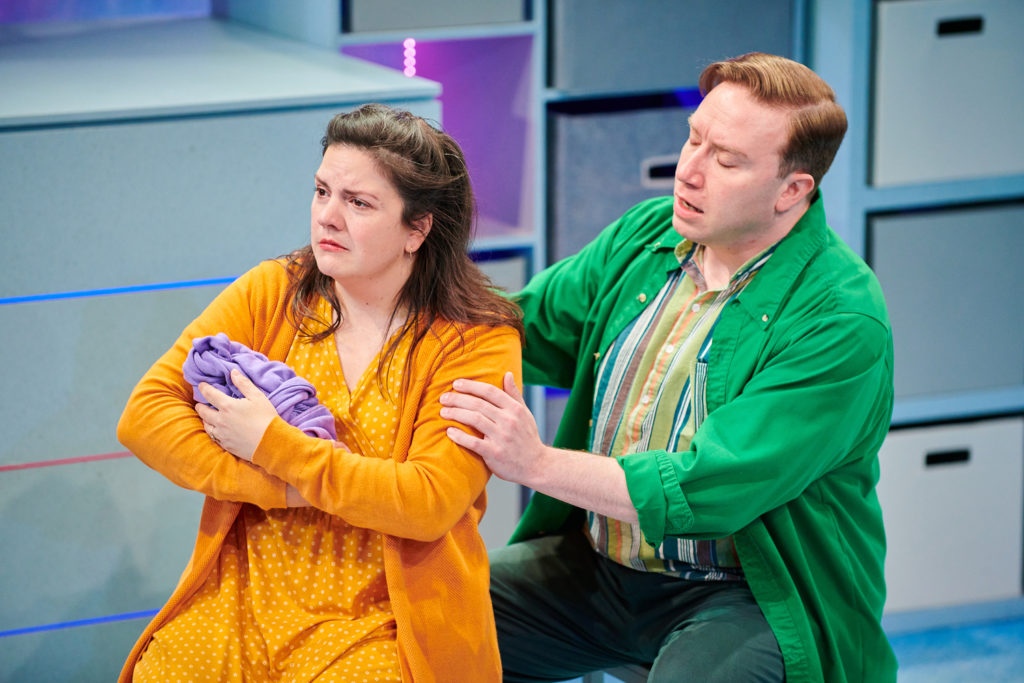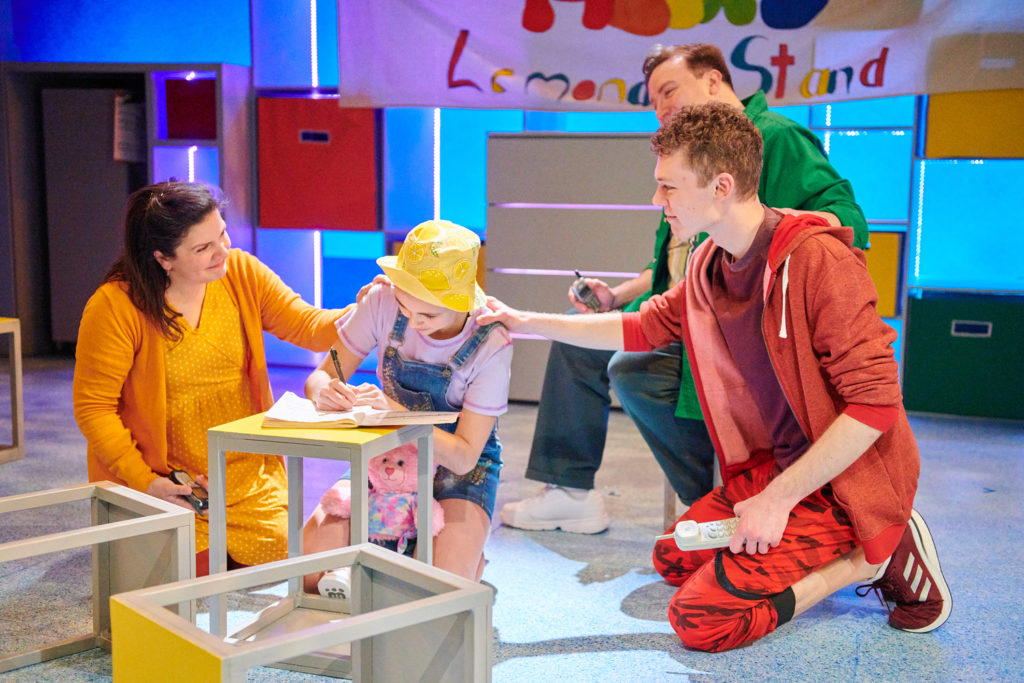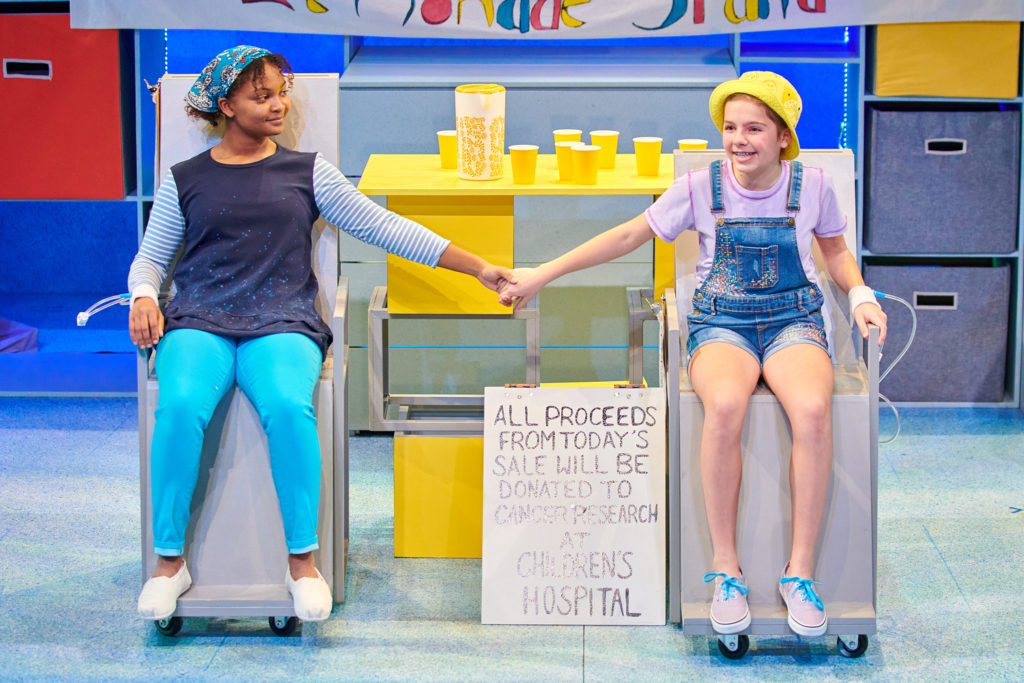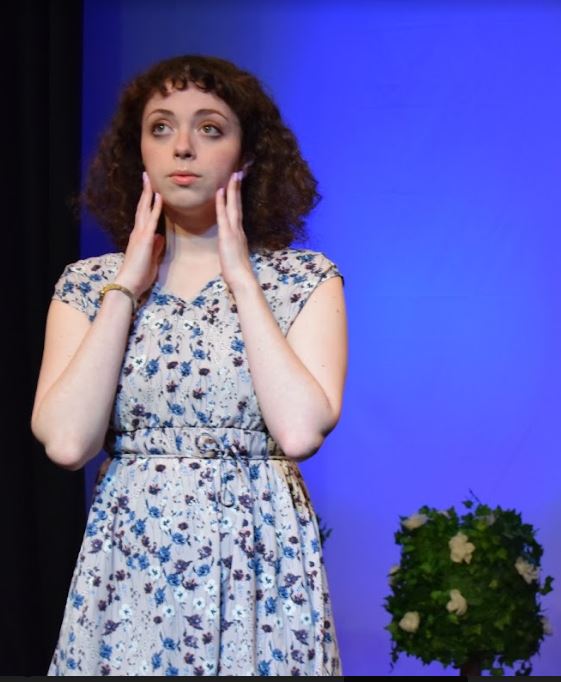When I first took my seat in the Todd Wehr Theater of the Marcus Performing Arts Center, I wasn’t quite sure what to expect. Facing a stage set with any number of bins and shelves that reminded me of a dystopian office or an overworked play space, I wondered how the actors got on stage.

But all was quickly revealed as a boisterous cast exploded on stage to open this masterful bit of theater that is The Amazing Lemonade Girl. American Players Theater stalwart, James Devita has written a very compelling play around the true story of Alexandra Flynn Scott and her determined efforts to help fund research for cures for childhood cancers.
The cast consists of six actors. One young actor depicting our principal character, Alex. And an ensemble of five others who depict at times, her family, a close friend, her doctors, her customers, and the supportive general public who aid her in reaching her goals.
There are two casts here. Both are anchored by adult actors. Rick Pendzich plays Dad and a number of others. James Carrington who plays a number of doctors, media types, and others. Karen Estrada who plays Mom and others. And then the Purple Cast which features Maia Scherman as Alex, Sanaiah Hibbler as her friend Theresa and others, and Liam Jeninga who plays her brother and others. This is the cast that I saw perform. And then the young actors in the Blue Cast are Pietja Dusek as Alex, Nala Patel as Theresa and others, and Andrew Kindler as Brother and others. These two casts alternate as the show’s run continues.

Mr. DeVita has given First Stage a demanding play about childhood cancer. The story is direct and truthful and presents the facts that confront all families following a diagnosis of cancer without lingering on the sadness surrounding the subject. And director Molly Rhode understands the text and nuances and moves the action along around Alex. We easily develop an empathy for Alex and celebrate the happy and sad times…the good and bad things. The cast celebrates the best while openly acknowledging the lows. And Ms. Rhode winds us through the whole story as Alex expresses her drive and determination while the ensemble moves from character to character…all with the aid of that at first perplexing scenic background. All with color and drama and action, all of the best kinds!

That transition by the ensemble from one character to another could be perplexing if Mr. DeVita text and Ms. Rhode’s direction hadn’t clearly stated out loud the transitions…and the quick and overdone costume changes clearly indicated each actors change in roles. Very nicely done!!

And this is an amazing story of a young girl’s determination to help other children who are suffering from childhood cancer. The top story is her lemonade stand and how the nation gets on board and supports lemonade stands in every state and contributions from all over. But the underlying story is her own experience with neuroblastoma starting as an infant. And the struggles and sacrifices her family made to provide the best care possible for her.
And the story goes on to give us insight into the issues she understood. That not all treatments were equal. That not all treatments affected each patient equally. And that hospitals, doctors, and researchers struggled to secure the funds to provide equal outcomes for all of their young patients.

And for me the most rewarding subscript is the monologues or asides from Brother. He clearly explains the unequal dynamic within the family unit as most of the emotional efforts of Mom and Dad revolve around finding a cure for Alex. And how he feels guilty for feeling upset that he’s left out in a way. And this pulls the parents to his side as well. A topic that often gets lost within stories like this. Mr. DeVita has presented this very well and Ms. Rhode’s staging brings Brother front and center. We get it. We feel it.
So we have Alex’s full story here. Her diagnosis, her treatments, her setbacks, her triumphs, and the love of her family. As I said earlier, this is told with truth and facts and directness. without over-dramatization. I think everyone in attendance will understand the story…the happy and the sad without dwelling on the sad.
As I said, I saw the Purple Cast. And I think that Maia Scherman as Alex was simply outstanding. She just had the right determination and the right attitude to play this role. For me, the standout was Liam Jeninga, who so totally nailed the monologues about his feelings and his place in the family late in the play. I didn’t see it coming but he played it just right.

The Amazing Lemonade Girl runs through May 15,2022. See more info and ticket details here:
Suggested for families with young people ages 7+. Approx. 70 minutes, no intermission.
Extra credit reading:
The Enrichment Guide (activities for pre- and post-theater):
And the info on Alex’s Lemonade Stand Foundation including Alex’s bio!





